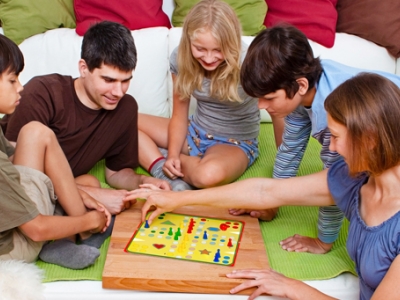
In a screen-based world, our children need limits
Christian solutions for 'The Anxious Generation’.
In my last article, I shared some ideas to encourage the kinds of play that Jonathan Haidt encourages in his new book, The Anxious Generation—that is, play that is synchronous (coordinated in time), in-person and with longer-term friendship groups.
In this article, I want to think through the flip side, that is, what does helpful, safe and wise play on screens look like?
You can tell the age of a person by the social media they default to. I’m an older millennial (though I relate more to Gen-X), so I spend more time on Facebook than I’m comfortable admitting to. But one trend I’ve noticed in the many ‘mum’ groups I follow is how often mums ask for advice about screens.
The posts sound a bit like this:
I swear, sometimes I feel like my 13-year-old son's iPhone is an extension of his arm! He's constantly texting, gaming, or watching YouTube videos. It's like he can't function without it! How do you get through to a teenager who's more interested in what's happening on their screen than in the real world?
Calling all moms of tweens! My 11-year-old daughter is officially addicted to her phone! She's constantly scrolling through Instagram, Snapchat, and who knows what else! I've tried setting screen time limits, but she always finds a way to sneak in more screen time.
My three-year-old just threw the mother of all fits because I had to turn off YouTube Kids! I know screen time isn't ideal, but seriously, does anyone have tips for dealing with toddler YouTube meltdowns? Feeling like I'm losing my sanity one Peppa Pig episode at a time!
Do any of these posts seem familiar to you? The problem is that if we adults, with our fully-formed prefrontal cortexes, are addicted to our phones and other devices, what hope do our kids have?
Play on screens—with clear limitations
Please don’t hear me saying that ‘good’ parents fill their weeks with the activities in my first article and never let their kids have screens.
I’m a working mum with a shift-working husband. That means that there are some days that my boys are home at 3.30 but I’m still working from home for a few hours. You better believe that they watch their fair share of TV! I’m also an introverted mum who works in ministry—you bet that I’ve often let them play computer games while I had a nap after morning church! The place of screens in our household is a work in progress.
The one encouragement I would make to parents around screen use for their children is to set clear limitations.
I’m going to share the process we came up with in our family, not because I think we have it all together, but because it might inspire you to come up with helpful boundaries of your own that will work in your own situation with your own unique kids.
When one of my sons was younger, he would ask to play screen-based games—all day, every day! At that age, he was prone to having tantrums—often. There were times I would be in tears within an hour of waking up in the morning because it was so hard to cope with.
Soon we realised that our son needed clear boundaries with computer games (otherwise he would drive us insane with asking!). He couldn’t yet read, so we decided to put smiley faces on the calendar so he could see when it was a ‘computer game day’ (which was, and still is, Fridays after school, some time on Saturdays and some time on Sundays).
Now my sons are 9 and 13 and they know not to even ask for computer games (or YouTube, which we later included) from Monday to Thursday. My eldest even had a friend come over on the Thursday afternoon before Good Friday this year. The friend assumed we would change the rule because the next day wasn’t a school day. I was so proud when my eldest told him, ‘Sorry, it doesn’t work like that!’
Tips for setting boundaries
Whatever boundaries you come up with around screens, can I encourage you to make them:
Clear: set the expectation for when and how long you are allowing them on a screen.
Predictable: have the same routine every week.
Enforceable: have clear consequences for if they don’t turn off the screen when you ask.
We made it clear that Friday, Saturday and Sunday are the only computer game days. Does this mean that the screens get turned on first thing on a Saturday morning and don’t go off until bedtime? No! And this is a big part of my work in progress!
Some ideas I’ve been trialling:
- Read 30 minutes, then play games for 30 minutes (I never reach this ratio!).
- Make sure your chores have been completed before you play games (This helps me manage the housework too!).
- Have a list of non-screen activities at the ready so the answer after the hyper-stimulation of games isn’t ‘Now I’m so boooooored!’.
Regarding enforceability, I wonder if the situations described in those Facebook posts above could be helped by including this.
My husband and I spent a lot of time making it clear to our boys that when the timer goes off, the game stops. This one is the hardest to enforce without shouts of ‘Just one more level!’.
Parents, we are in a battle against a technology that is designed for ‘just one more’. There is always one more challenge, battle, token, or any other shiny thing that will deliver a hit of dopamine in our children’s brains. And when they ask for more, it’s the chemicals in their brain that are driving that need (and it’s those same chemicals that has me watching ‘just one more’ YouTube clip before bed!).
It is a tough battle, but you are the ones to whom God has given the task of starting children off in the way they should go, so that when they are older they don’t depart from it (Proverbs 22:6). So it’s a battle that is definitely worth fighting—over and over again. And it does get easier.
Social media
I’ve spoken about boundaries with screen-based games because I’m a mum of boys and statistically, as Haidt points out in his book, they are more likely to be drawn to games.
For girls, social media is more pervasive and sadly, the harms are more prevalent. In one graph on his website, Haidt notes that for boys as well as girls, increased social media use leads to increased rates of depression—yet for the boys who used social media 5+ hours a day, only 15% were depressed, compared to the almost 40% of girls who used social media as much.
Instagram, the most popular platform for teen girls, is also the most harmful. In one study Haidt cites, girls who are shown Instagram images that have been manipulated to be ‘extra attractive’, tend to end up with lower self-esteem and a more negative self-image.
Perhaps clear, predictable and enforceable boundaries in social media use might help girls to the same extent as they have helped my sons with their computer game usage.
Another temptation for boys is pornography, which is so easy to access. This frightening report from the Australian Institute of Family Studies, found that nearly half of children aged 9 to 16 experience regular exposure to sexual images. Although this won’t remove the problem entirely, internet filters, accountability software (like covenant eyes) and a rule to not allow phones, computers and iPads in bedrooms can mitigate this somewhat.
Sometimes I wonder whether if, in a generation’s time, we will look back at this time with the same incredulity we have for the generations who thought smoking was just a benign hobby.
Some good news
But let’s finish with some good news! In October 2023, mobile phones were banned from all public schools in NSW. Having been involved in High School SRE teaching for the past decade, I remember distinctly being surprised how loud the sounds were in the playground at my local high school when I arrived for our Christian lunchtime group on the first week of the ban. For the first time in ten years, teens were playing at lunchtime—the kind of in-person, synchronous play that Haidt recommends!
And there is even better news, because as Christians, we are not alone. We have been given God’s powerful Spirit who enables us and our children to keep seeking the things above, not earthly things (Colossians 3:1–4). And we have been given the real-life community of the church, where we can encourage one another in the joys and challenges of raising ‘Martians’ who are equipped to live as ‘aliens and strangers’ in this new screen-based world.
---
Before training for ministry, Jenn taught courses in English Literature, History and Cultural Studies at universities in Australia and China. Jenn's ministry passion and experience is in SRE. She lives and serves in the South of Sydney with her husband and two children.

The Forgetful Prince
This beautifully illustrated book helps children aged 3 to 7 to know and remember the truth we read in the Bible: that God is good, his children are precious to him, and they have a very special place in his kingdom.
For more articles from Growing Faith, subscribe to our monthly e-newsletter.
To hear about the latest books and resources from Youthworks Media, subscribe here.








